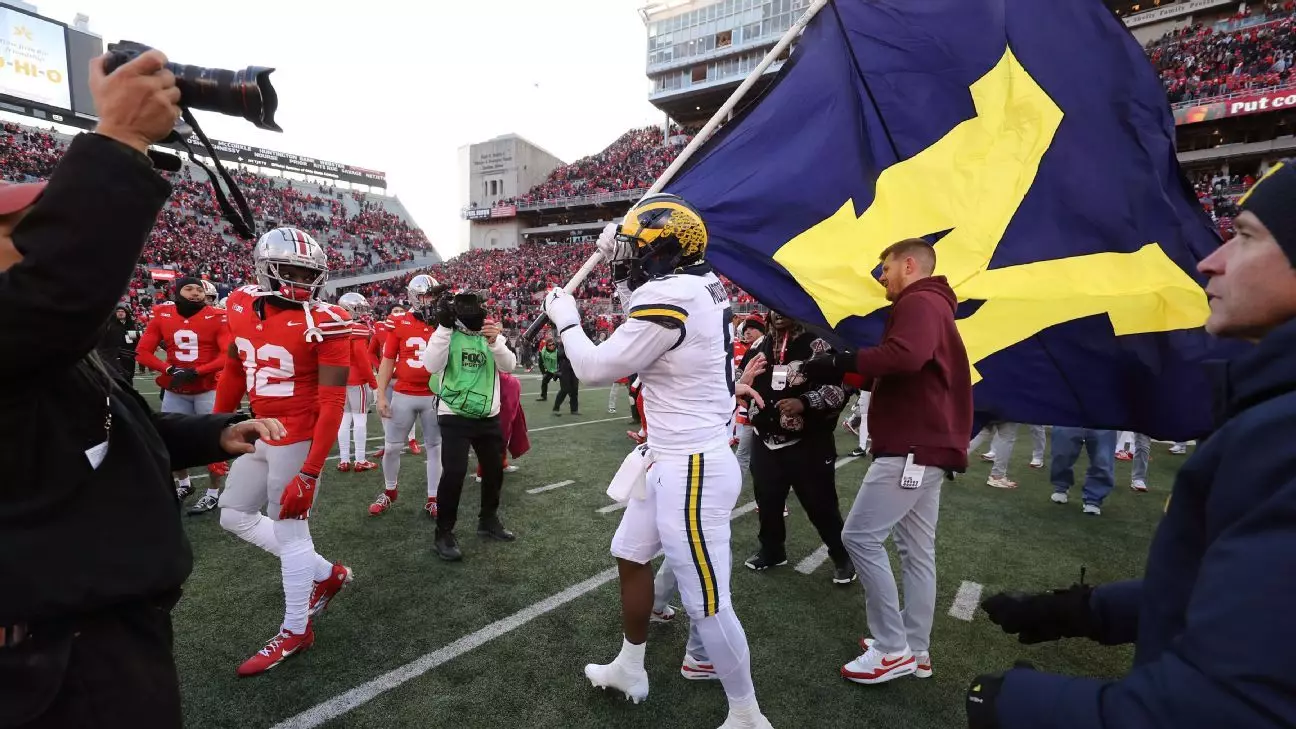The annual clash between the Michigan Wolverines and the Ohio State Buckeyes has long been regarded as one of the fiercest rivalries in college football. However, the recent match on Saturday escalated into chaos following an unexpected brawl that marred the post-game celebrations. The events of the day, which culminated in pandemonium at The Horseshoe, raise questions about emotions in sports, the essence of rivalry, and the influence of sportsmanship.
The stage was set for a classic confrontation between two powerhouse programs, with Ohio State holding the second-ranking in the nation and Michigan heading in as significant underdogs. The Wolverines, facing a daunting 20.5-point spread, were poised against a backdrop of high expectations for the Buckeyes. The anticipation surrounding the game built not only from the stakes on the field but also from the deep-rooted animosity between the two institutions, a rivalry dating back generations. A surprising upset, with Michigan clinching a 13-10 victory, sent shockwaves throughout college football.
In a move that ignited the tensions already brewing from the bitter rivalry, the Wolverines celebrated by planting their flag on the Buckeyes’ famed Block O logo. While some may view this act as a triumphant statement of victory, others saw it as incendiary provocation. Understandably, emotions exploded in the heat of the moment; what should have been a scene filled with jubilation quickly devolved into chaos. Ohio State players, unable to accept the perceived disrespect, responded by throwing punches, leading to a wild melee that made headlines across the nation.
As punches were thrown and both sideline benches erupted with fury, police were called in to restore order. The influx of law enforcement, including the deployment of pepper spray, underscored the severity of the situation, illustrating that what began as a sports competition turned dangerously out of control. In the aftermath, injuries were reported, meaning that a spirited rivalry had crossed the line into physical altercation, raising concerns about the conduct of both players and staff involved.
Ohio State’s coach Ryan Day condemned Michigan, suggesting that their actions instigated the brawl. He highlighted the indignation felt by his players, asserting, “This is our field and certainly we’re embarrassed by the fact that we lost the game.” His frustration is understandable; the ethos of competition invites intensity, but it does not extend to violence.
On the flip side, Michigan’s head coach Sherrone Moore acknowledged the emotional nature of rivalry games but expressed a desire for both teams to have handled the situation with greater composure. Moore’s reflection represents a call for an introspective examination of how teams conduct themselves in high-pressure matchups.
The incident on the field serves as a stark reminder of the fine line between rivalry passion and poor sportsmanship. Both players and coaches must hold themselves accountable for their actions, not just in victory, but importantly, in defeat. Michigan’s running back Kalel Mullings voiced sentiments echoed by many when he remarked on the implications of fighting post-game: “You can’t be fighting just because you lost.” His statement captures a crucial element of sports integrity; to honor the game and respect opponents regardless of the emotional stakes.
Ultimately, this incident challenges the narrative commonly attached to college athletics. While passion is a driving force in sports, it must be balanced with decorum and respect for the game itself. As rivalries continue to ignite fervor among players and fans alike, the focus should shift toward fostering a culture of sportsmanship, one that acknowledges the competitive spirit without succumbing to primal instinct.
The Michigan-Ohio State battle not only tested the limits of competition but also reflects important lessons in emotional management and the responsibilities inherent in athletic performance. Rivalries will persist in fueling animosity, yet it is critical that participants engage in healthy competition, allowing their passion to inspire rather than incite.


Leave a Reply